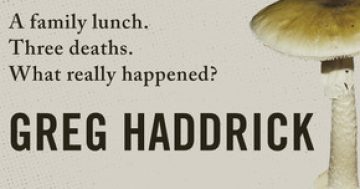Reviewed by Robert Goodman.
By Anne Buist, Text, $32.99.
 Anne Buist continues to put the psychology, and particularly the psychology of women and mothers, in the centre with what may be the final entry in her Natalie King series Locked Ward. King debuted in Medea’s Curse and two further books followed – Dangerous to Know and This I Would Kill For. In each of these King, a forensic psychologist, has put herself on the line to uncover the truth.
Anne Buist continues to put the psychology, and particularly the psychology of women and mothers, in the centre with what may be the final entry in her Natalie King series Locked Ward. King debuted in Medea’s Curse and two further books followed – Dangerous to Know and This I Would Kill For. In each of these King, a forensic psychologist, has put herself on the line to uncover the truth.
Locked Ward’s cold open is titled ‘four days after the murder’ and the next series of chapters is headed ‘Before the murder’. This is necessary foreshadowing as the early plot, which focusses around King checking herself and her one year old into a baby sleep clinic, might otherwise leave some readers wondering. While her first few days in the clinic are somewhat interesting, the titles key readers in to looking out for strange behaviour and anticipate an impending tragedy. Buist uses this time introduce the range of women, their partners and the staff in what will become a kind of locked room mystery. That mystery, the death of a nurse, seems like an open and shut case with Shamilla, a refugee on temporary transfer from detention in Nauru, being found at the scene with a scalpel. But despite all of that evidence, King knows that Shamilla is unlikely to be the killer and, together with her sister who also happened to be at the centre at the time, starts to investigate the other mothers.
Buist puts King, with her psychiatric and observational skills, in the middle of the action. Shamilla is being supported by one of the other psychiatrists at the facility in which King works; King’s ex Damien (and father of her child) is one of the police investigators; and her formerly fairly estranged sister has become friendly with many of the other mothers. And this also puts pressure on her relationship with her new partner Liam, who has grown children in Sydney and is looking to potentially move away from Melbourne. On top of this, King is managing her own bipolar nature with a drug regime that does not always work as effectively as it could.
As always, Buist brings her perinatal psychology knowledge to bear through King in a way that informs the plot rather than preaches to readers. But Locked Ward also deals with some other hot-button issues including Australia’s treatment of refugees and some of the assumptions that underlie that treatment.
For all of that, this is almost an Agatha Christie style locked room murder mystery. The book even has a map of the clinic with the locations of the rooms of all of the mothers and their babies. Armed with this map readers can work with the King sisters as they use a similar map to try and work out where everyone was at the time of the murder. Add in some red herrings, a range of other issues playing out, and Buist delivers a satisfying resolution although without the drawing room scene.
Buist says in her Acknowledgements that she is putting Natalie King aside for a while. While her work in forensic psychiatry gave her a perfect in to continue a series, there is only so many times that personal stakes and connections can drive the tension forward. Locked Ward is a fitting (temporary?) end to a fascinating and in some ways unique Australian crime series.
Over 850 more book reviews can be found on Pile by the Bed.










